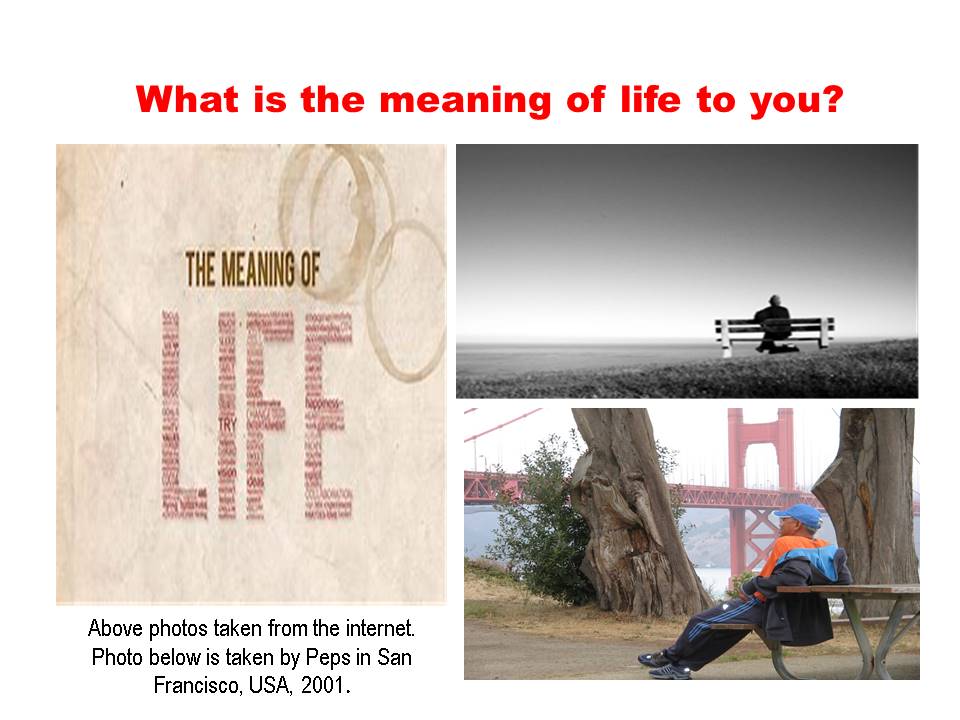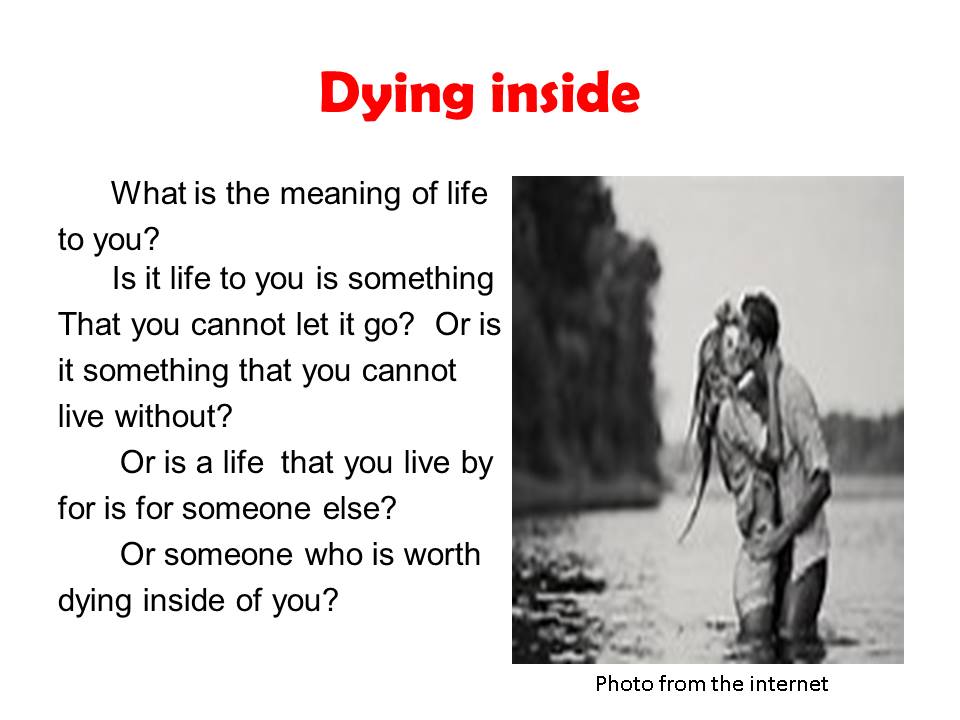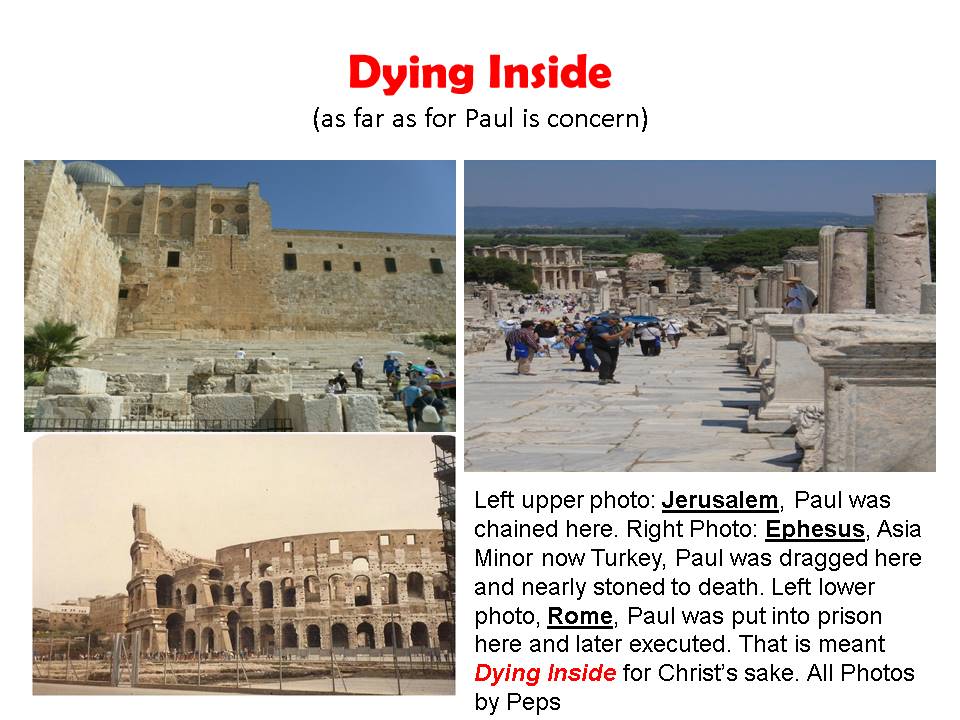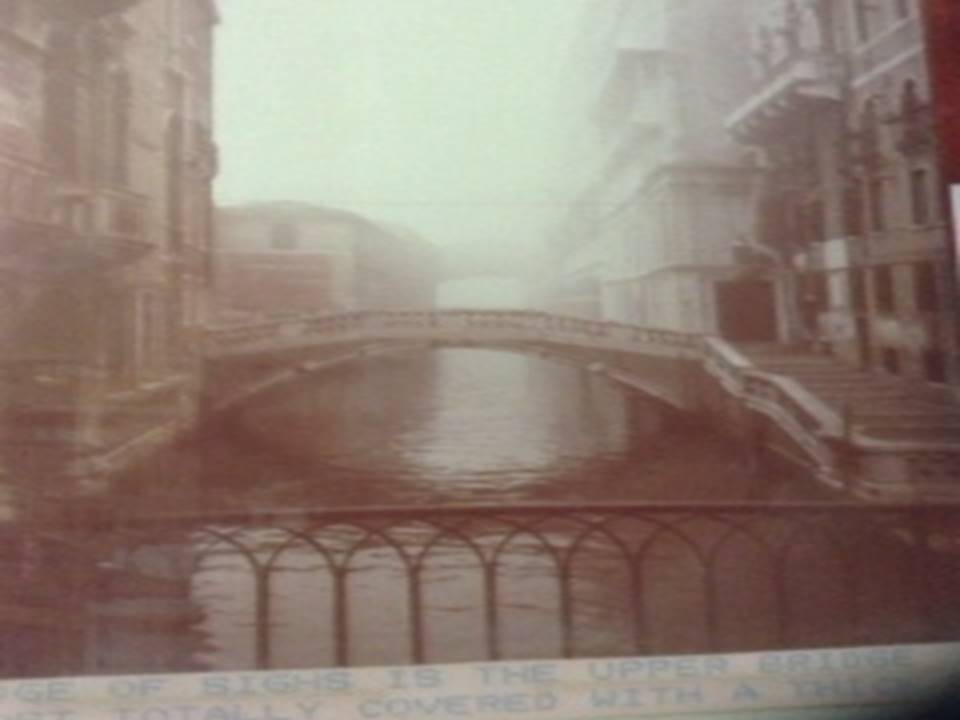Dying Inside
- Details
- Category: Teachings & Articles
- Published: Monday, 19 March 2018 17:54
- Hits: 5754
Dying Inside
By Augusto A. Kho
March 18, 2018 (Sunday); 9:00 A.M.
What is the meaning of life to you?
(picture1)
Someone else
Is it life to you is something that you cannot let it go? Or is it something that you cannot live without? Or is it life that you live by for is for someone else? Or life is for someone that is worth drying inside of you?
“This is one of the most requested songs perhaps this week. I often hear the song almost every day since Wednesday. I hear that song again Friday at SM MOA. Then I heard it again over the radio late Saturday afternoon. It is a remake song sung by Darren Espante (if I am not mistaken).
(picture2)
Your breath away
Jesus claimed He is the life or zoe in Greek (John 14:6). And to have life is to live. Live in Greek “zao” means “ to breath, be among the living; to live; to enjoy real life; to have true life and worthy of the name,” (Gal. 2:20). And it is very interesting to note that the three major constituents of Earth's atmosphere, are nitrogen, oxygen or air, and argon.
Without air to breath, can you live?
It is very impossible for any man to live without an air to breathe. And it is only that God through Christ who can take your breath away (Genesis 2:7; 2 Kings 4:35; John 1:4)
The song
The song goes like this:
“And I was dying inside to hold you
I couldn't believe what I felt for you
Dying inside, I was dying inside
But I couldn't bring myself to touch you”
Why dying inside?
Why dying inside? What is dying inside of you? Have you been experiencing that or have you experienced that before? And what makes your life worth living for? And that reminds of a very specific verse. Galatians 2:20
Struggle within..
The worship song entitled, “I Delight to do your will..” came to my mind when I heard, “Dying inside.” And that song also reminds me of someone
Why many people get hooked and willing to die for love yet how many Christians are willing to die for the Lord Christ? Or we are still struggling from within? Or shall we put preference in serving ourselves than Him?
I met this once committed young Christian who had been walking with the Lord for many, many years. And he often pushed me hard to stand to speak in behalf of the Church and to our dear Lord. But lately his love to Him gone stale. I asked him what has gone wrong? He said me these:
“Can’t I live a life that I want? Do I need to please other people? Can’t I find my own happiness?”
And so sad He let Him Christ go.
Letting the Lord go is like putting a chain over your neck. It is a self-destructive move that loses your immunity of divine protection from God. And it makes you blind to the path of righteousness where vision become blurred and devoid of direction to where you are destined for.
Our struggle not matter how unique we may call it is not something unimaginable. Sometimes we felt as if the whole world is against us and we feel are all alone in this journey of our struggle. But the truth of the matter is, we always at war against ourselves. Should we want to please God in our flesh, the body always resists that. It is common though even as Paul himself declared it in 1 Corinthian 10:13. Even Christ Himself has been tempted in every way. (Mark 1:13; Luke 10:25; Heb. 2:18).
I couldn’t imagine myself letting Him go? I would die without Him. Should you ask me why am I
living now? I live for Him and by Him alone. What would my life be without Him?
(picture3)
Photo from the internet
That is why Paul said in Romans 7:21-25/ NLT:
“I have discovered this principle of life – that when I want to do what is right, I inevitably do what is wrong. I love God’s law with all my heart. But there is another power within me that is at war with my mind. This power makes me a love to the sin that I stilll within me. Oh, What a miserable person I am! Who will free me from this life that is dominated by sin and death? Thank God! The answer is in Jesus Christ our Lord. So you see how it is: In my mind I really want to obey God’s law, but because of the sinful nature I am slave to sin.”
Paul is willing to be crucified with Christ and willing to die for Him as well but he has other crosses to bear and has a direct personal enemy. His enemy is within him – himself. Like us. our enemies are ourselves – the sin in us.
The words from NLT “at war” in King James Version (KJV) as “warring against” is taken from Greek word ”antistrateuomai” means “to make military expedition or take a field against anyone; war against; to attack or to destroy,” according to Thayer.
In as much that the Spirit of God would like to bring us closer to the Lord our flesh makes enmity against our spirit (Romans 8:7-9).. No wonder that our physical and carnal appetite dominates us and our spirit at most times.
Paul was born Jewish yet he holds a Roman citizen status. He was privileged enough to be under the tutorage of great teacher of the law no less than Gamaliel yet he was nearly beaten to death, laid many stripes, yet God did not spare him. He too, must go through a process should he be liked as gold. (Acts 22:25, 26; 22:3; 2 Cor. 6:4-9).
Paul is like being nailed on a cross like his own Master Christ. He said, “I am crucified with Christ.” In as much that he wanted to live a life he wanted, his flesh he said is already pierced on the flesh that he could no longer move in his own. His life is completely given to Christ for His divine disposal.
Which life?
Again, I would ask what is life is to you? Which life will you choose? Your own or God’s own will? Take note of the words of Paul when he said this, “the life which I now live..”
Galatians 2:20, “I am crucified with Christ: nevertheless I live; yet not I, but Christ liveth in me: and the life which I now live in the flesh I live by the faith of the Son of God, who loved me, and gave himself for me. “
(picture4)
“Life which” according to Thayer Bible Dictionary are inseparable words
Thayer described these words “life which “ from the Greek “hos” referring to the words, “ who, which, what, that, a form of an article.”
Article (Webster) is a grammar or any of a small set of words or affixes (such as a, an, and the) used with nouns to limit or give definiteness to the application. Affixes attached to a word stem to form a new word or word form.
In other words, the Greek word “ho” is like a compound word which is inseparable words that form an article to describe “what life” is all about according to Paul. And Paul described it :”life which I now live” referring to CHRIST ALONE.
Crucified ….. once mentioned…”
Live and liveth………... 4 times mentioned
Life………… once mentioned
Love……… once mentioned
Gave………. Once mentioned
The words “live” and “liveth” were mentioned by Paul five (5) times suggest of life’s meaning. For him, it is why he is here on earth for. And he exists for Christ alone. Christ alone is his reason for living. We call it in French, “raison d’etre” which means “the meaning of life” or “the reason to live.” How about us? What is our life are meant for?
Definition of Terms
-
Crucified is ”sustauroo” i.e. to crucify alone with. Root word, “stauro” i.e. to impale on the cross.
-
Live is “zao” i.e. to breath, be among the living; to live; to enjoy real life; to have true life and worthy of the name
-
Faith Greek “pistis” i.e. conviction of true; moral conviction of the truthfulness of God.
-
Love Greek agapao i.e. to love dearly
-
Gave Greek “paradidomi” i.e. to give into the hands of another
Dying inside
What this song “Dying inside” meant for you? What is dying inside if we speak of Paul’s commitment to Christ? It simply means to die in sin that we may live for Christ.
Dying inside for Christ’s sake as far as Paul is concerned is that he is willing to be chained in Jerusalem, if necessary; willing to be stoned in Ephesus, if the Lord calls for it; and he is willing to die in Rome for Christ if such gives Him a greater honour and glory. Paul’s love to God was put into test yet Paul though he was martyred he finished his race with grace.
(picture5)
There’s nothing wrong serving and dying for your country. It speaks of being a good patriot. Even Paul loved his own countrymen when he spoke of their zeal for God’s service. However, Paul questioned to whom their zeal are meant for? He said in Romans 8:1-4,
(picture6)
“Brethren, my heart's desire and prayer to God for Israel is, that they might be saved. 2 For I bear them record that they have a zeal of God, but not according to knowledge. 3 For they being ignorant of God's righteousness, and going about to establish their own righteousness, have not submitted themselves unto the righteousness of God. 4 For Christ is the end of the law for righteousness to every one that believeth.”
And perhaps there is nothing wrong dying for someone you hold dear?
Remember that classic love story, “Romeo and Juliet?” When the Juliet pretended she ended her life for Romeo to win him over from her adamant father but only to find out the Romeo himself truly ended his life for her? Both died in the process. And I saw where there dying moments put at rest when I visited the “Bridge of Sighs” in Venice, Italy on 1985 where this epic love story was shoot at.
(picture7)
Bridge of Sighs, Venice where Romeo and Juliet shoot at.
Photo by Peps (1985)
Live again
Would it be worth dying for someone else? What will you gain for that? Or to whom your life should be worth dying for? For Apostle Paul he said in Philippians 1:21; “For to me to live is Christ, and to die is gain.” After all, Jesus holds the key of death and He can always bring you back to life again. And that is for eternity. (Rev. 1:18; John 11:25). To die for Christ is for you to live again.
(picture8)
Photo from internet
“But none of these things move me, neither count I my life dear unto myself, so that I might finish my course with joy, and the ministry, which I have received of the Lord Jesus, to testify the gospel of the grace of God, “ – Saint Paul (Acts 20:24)
Song Lyrics
“Dying inside to hold you”
It's turning out just another day
I took a shower and I went on my way
I stopped there as usual
Had a coffee and pie
When I turned to leave
I couldn't believe my eyes
Standing there I didn't know what to say
Without one touch we stood there face to face
And I was dying inside to hold you
I couldn't believe what I felt for you
Dying inside, I was dying inside
But I couldn't bring myself to touch you
You said hello then you asked my name
I didn't know if I should go all the way
Inside I felt my life have really changed
I knew that it would never be the same
Standing there I didn't know what to say
First time looked away when I whispered your name
And I was dying inside to hold you
I couldn't believe what I felt for you
Dying inside, I was dying inside
But I couldn't bring myself to touch you
And I was dying inside to hold you
I couldn't believe what I felt for you
Dying inside, I was dying inside
But I couldn't bring myself to touch you
One hello changed my life
I didn't believe in love at first sight
But you've shown me what is life
And now I know my love (I know it's coming right)
And I was dying inside to hold you
I couldn't believe what I felt for you
Dying inside, I was dying inside
But I couldn't bring myself to touch you
And I was dying inside to hold you
I couldn't believe what I felt for you
Dying inside, I was dying inside
But I couldn't bring myself to touch you
Romeo and Juliet
“Romeo and Juliet is a tragedy written by William Shakespeare early in his career about two young star-crossed lovers whose deaths ultimately reconcile their feuding families. It was among Shakespeare's most popular plays during his lifetime and along with Hamlet, is one of his most frequently performed plays. Today, the title characters are regarded as archetypal young lovers.
Romeo and Juliet belongs to a tradition of tragic romances stretching back to antiquity. The plot is based on an Italian tale translated into verse as The Tragical History of Romeus and Juliet by Arthur Brooke in 1562 and retold in prose in Palace of Pleasure by William Painter in 1567. Shakespeare borrowed heavily from both but expanded the plot by developing a number of supporting characters, particularly Mercutio and Paris. Believed to have been written between 1591 and 1595…”











